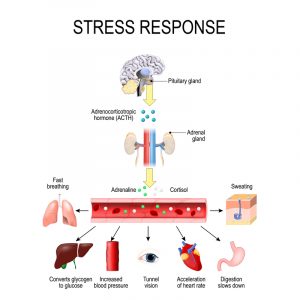What you need to know about Adrenal Fatigue from a Functional Medicine provider
Functional Medicine provider, Dr. Alexandra MacKillop, DC, explains why standard lab tests sometimes overlook symptoms of thyroid disease:
Fatigue, body aches, weight changes, dizziness, hair loss…
What all these symptoms have in common is the indication that a person may be suffering from a form of chronic stress commonly known as “adrenal fatigue.” While it’s important to keep in mind that the cause behind these symptoms is not always adrenal fatigue (many other health concerns can present with these symptoms,) adrenal fatigue is a common topic that comes up in the Functional Medicine conversation.
Because the goal of Functional Medicine is to restore the body to optimal function, understanding adrenal fatigue first requires some context about how the body’s stress organs and stress responses ordinarily function under optimal circumstances.
Understanding Your Body’s Stress Response
 The human nervous system always occupies one of two stress-related states—parasympathetic and sympathetic—commonly referred to as the “rest-and-digest” state or the “fight-or-flight” state, respectively.
The human nervous system always occupies one of two stress-related states—parasympathetic and sympathetic—commonly referred to as the “rest-and-digest” state or the “fight-or-flight” state, respectively.
During moments of relaxation, the parasympathetic nervous system is activated, and we enjoy all of our bodies’ healthy, restorative, balancing physiological functions. These include digestion, low blood pressure and heart rate, fertility, and a feeling of peace and calm.
During periods of stress, the sympathetic nervous system or “fight-or-flight” system becomes dominant, increasing heart rate and blood pressure, and slowing down bodily functions that are not essential in overcoming the stressor.
While it is both normal and expected for us to face periods of stress throughout our lives (maybe even on a daily basis, to some extent), staying in the sympathetic state for too long or facing stress triggers too frequently can lead to health problems that often bring debilitating symptoms.
What is Adrenal Fatigue?
Life stress comes in many different forms, though we often think of it in terms of psycho-emotional factors such as work demands or relational strains. However, the stress response in the body may also be triggered by illness, exertion (including intense exercise), nutritional inadequacies (especially under-eating), and more.
When a healthy person faces stress in his or her life, the body’s natural stress system (the sympathetic division of the nervous system) is well equipped to handle it. In a healthy stress response, the brain sends signals to a pair of glands located in a person’s abdomen, triggering the release of stress hormones. These hormones, including adrenaline, cortisol, DHEA and more, then enter the blood stream and travel throughout the body to create changes such as slowed digestion, elevated blood pressure, dilated pupils, an increased heart rate and breathing rate, increased mental focus, and more.
Once the stress trigger is overcome, everything is then free to relax: the adrenal glands stop producing the high level of stress hormones, and we resume our status quo.
 Along Comes Too Much Stress
Along Comes Too Much Stress
When a person is exposed to too much stress—that is too long, or too frequently—the body’s stress response falls into dysfunction. This dysfunction follows a predictable pattern, culminating in a set of symptoms commonly known as adrenal fatigue:
- Stage 1: In the first stage of chronic stress, the body’s stress response becomes overactive, in a sense. This means that the release of stress hormones in response to a trigger increases more quickly than usual and remains elevated even long after the stress trigger has resolved.
- Stage 2: In the second stage of chronic stress, after the body has been stuck in a heightened stress state for a period of time, the body begins to lose track of what is and is not an appropriate reason to elicit a response. This results in a functionally backwards pattern in which the body triggers stress hormones to be released during times when no stress trigger exists; likewise, in situations in which a person might expect to feel triggered, the body fails to produce the appropriate stress response.
- Stage 3: In the third stage of chronic stress, the body altogether fails to produce a normal stress response. Even when real triggers are present, the nervous system fails to communicate with the adrenal glands properly, which subsequently fail to produce sufficient levels of stress hormones. The symptoms that accompany this stage are often referred to “burnout” or “adrenal fatigue,” but the medical term for all three stages of the chronic stress syndrome is hypothalamic-pituitary-adrenal axis dysfunction, or HPA axis dysfunction.
The timeline for progression through the three stages of HPA axis dysfunction—and chronic stress—looks different for different people, and depends on factors like age, biological sex, co-existing diagnoses, and personal history. This means that some people facing chronic stress may progress quickly to stage 3, possibly within just a few months, but others may not reach that point for years.

What are the symptoms?
The specific symptoms may likewise differ from person to person, but most people experience some of the following:
- Body aches and pains
- Hair loss
- Headaches or migraines
- Skin discoloration
- Weight gain or weight loss
- Loss of libido and/or motivation
- Anxiety or depression
- Frequent respiratory infections
- Low blood pressure
- Dizziness
- Fatigue
- Mental confusion (i.e. “brain fog”)
- Insomnia
What causes Adrenal Fatigue?
 Chronic exposure to psycho-emotional stress is the most commonly known cause of HPA axis dysfunction, though it is not the only one. Excessive exercise, inadequate nutrition habits (especially undereating), use of stimulants such as caffeine or nicotine, poor sleep habits, use of certain medications, and other lifestyle habits may also contribute to the development of adrenal fatigue. For most patients, it is a combination of triggers over time that ultimately predisposes them to develop symptoms.
Chronic exposure to psycho-emotional stress is the most commonly known cause of HPA axis dysfunction, though it is not the only one. Excessive exercise, inadequate nutrition habits (especially undereating), use of stimulants such as caffeine or nicotine, poor sleep habits, use of certain medications, and other lifestyle habits may also contribute to the development of adrenal fatigue. For most patients, it is a combination of triggers over time that ultimately predisposes them to develop symptoms.
However, the symptoms of adrenal fatigue are not unique to HPA axis dysfunction. This means that other conditions may be the true root cause. Other conditions that may contribute to the development of these symptoms include:
- Thyroid dysfunction
- An imbalance in gut bacteria
- Nutritional deficiencies
- Clinical depression, anxiety, or other mood disorders
- Adrenal diseases such as Addison’s Disease
- Neurologic disease
- Autoimmune disease
- …and more!
Because the of the diversity of potential causes underlying a person’s symptoms, it’s essential to not assume that adrenal fatigue is the correct label. Functional Medicine Doctors at Aligned Modern Health are committed to an evidence-based approach, which means that we run diagnostic tests with our patients so that we can make accurate diagnoses and put together a safe, effective, and minimally invasive treatment plan for our patients.
How Does Functional Medicine Test for Adrenal Fatigue?
 Testing for adrenal fatigue involves a combination of blood test and specialty diagnostic testing through saliva. Depending on a patient’s symptoms and history, his or her Functional Medicine Doctor may order some additional or alternative tests in order to rule out the possibility of other conditions. The most common test used in suspected cases of HPA axis dysfunction is a saliva test which a patient completes by collecting saliva samples in small tubes at different periods throughout the day. These tubes are then sent to a laboratory for analysis of hormone levels, and the results are then assessed by the doctor in making a diagnosis and putting together a treatment plan.
Testing for adrenal fatigue involves a combination of blood test and specialty diagnostic testing through saliva. Depending on a patient’s symptoms and history, his or her Functional Medicine Doctor may order some additional or alternative tests in order to rule out the possibility of other conditions. The most common test used in suspected cases of HPA axis dysfunction is a saliva test which a patient completes by collecting saliva samples in small tubes at different periods throughout the day. These tubes are then sent to a laboratory for analysis of hormone levels, and the results are then assessed by the doctor in making a diagnosis and putting together a treatment plan.
How Does Functional Medicine Treat Adrenal Fatigue?
Because everybody is different and the underlying factors contributing to HPA axis dysfunction vary so widely from person to person, treatment plans likewise look different for each patient. However, every treatment plan will involve a variety of lifestyle interventions (nutrition, exercise, sleep hygiene, stress management) and nutraceuticals (clinical-grade herbs and supplements) to help support the body in healing. Some patients may also be referred for co-management with other providers, such as an acupuncturist or nutritionist.
If you are struggling with symptoms that you suspect may be related to chronic stress or anything else make an appointment with a Functional Medicine Doctor at the Aligned Modern Health clinic nearest to you! We also provide telemedicine in select states. Complete the form below to connect with a patient coordinator for more information.
 About Dr. Alexandra MacKillop, DC
About Dr. Alexandra MacKillop, DC
Dr. Alexandra MacKillop is a Functional Medicine Telemedicine provider at Aligned Modern Health. She graduated magna cum laude from National University of Health Sciences with her Doctorate in Chiropractic Medicine and has completed postgraduate training in functional blood chemistry analysis, gastrointestinal health, autoimmunity, inflammation, and functional endocrinology. Her interests include women’s health and fertility, thyroid dysfunction, prenatal and postpartum support, among other conditions. Dr. MacKillop practices through a holistic care model, taking into account all aspects of her patients’ health while at the same time prioritizing their individual values and preferences.
Schedule
Please fill out the form to request an appointment at our health and wellness center for the service and location of your preference. We try to get back to all requests as quickly as possible. If you need immediate assistance, please call 773-598-4387.
Your safety comes first: we are operating with heightened safety measures in our clinics and offer telemedicine for those unable to visit in person.










